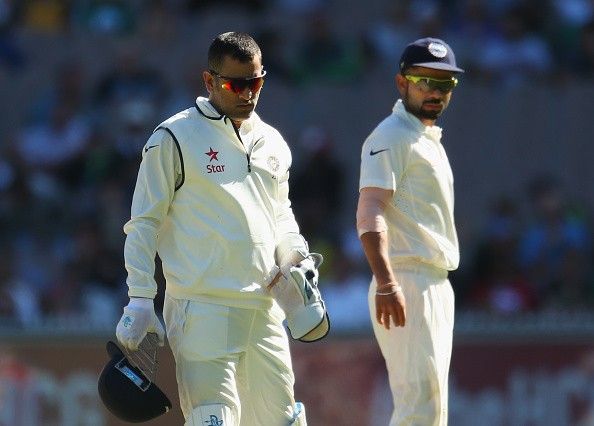
Virat Kohli must help India come out of MS Dhoni's shadow

It wasn’t the Neanderthal age when India were the number one ranked Test team in the World, it was four years ago. But the memory almost paints a prehistoric picture when you think about what’s transpired since.
India have lost six out of their last eight overseas assignments. It wasn’t that India set the world ablaze before the rot, but they did fight to the hilt.
Since the 2010-11 tour of South Africa, India have lost a mind-numbing 16 overseas Tests, the most by any international side. During a successful period from 2002 to 2010, India were notoriously lazy starters. The first Test was often the hardest hurdle to overcome. Despite an early loss though, India’s knack of bouncing back often saved them the rancour of a whimsical public.
It took two ignominious whitewashes for that sentiment to fade, and expectations have drowned to the seabed since. India’s unfathomable defeat from pole position at Galle was a painful reminder of the treacherous road ahead. It is precisely at this point that Virat Kohli’s role becomes relevant. Like a liquid takes the shape of a container, the team moulds itself around the captain.
While we must disassociate MS Dhoni’s reign from that of Kohli’s, which has just commenced, Kohli must remember that Dhoni left a part of his soul in the team he has acquired. It felt as though Dhoni’s silhouette momentarily hung over Galle when Dinesh Chandimal ran amok.
What was worrying wasn’t necessarily Kohli’s tactics, but the manner in which India were bullied by a team that had failed to turn up for majority of the first three days. Morbid memories came flooding back as India capitulated for the umpteenth time to lose the Test in a session and a half.
Irrespective of the defeat, another contentious issue that needs urgent addressing is team selection. In that regard, a loss may not have been the worst result considering how a win inside three days would have conveniently camouflaged obvious maladies. Kohli’s willingness to drop a serial offender in Rohit Sharma can be used as an indicator of his elasticity. Continuity and flexibility cannot be mutually exclusive here.
During Dhoni’s days as skipper, persistence with non-performers often bordered on nepotism. Players attached to his apron strings had a longer rope than others. What other logic explains Suresh Raina and Ravindra Jadeja’s numerous forays into the Test side, while more fitting candidates were either blatantly ignored or left to carry drinks? In fact, the entry of India’s most reliable overseas batsman these days – Ajinkya Rahane – was delayed by Dhoni’s stubbornness to tinker with the Test side.
While every captain develops faith in some players, it shouldn’t lead to the formation of a cosy club closed to ‘outsiders’. Also, the tendency to rationalise a dubious selection dominates the future course of action.
Indian captains have traditionally had powerful defence mechanisms. Their sense of entitlement is known to supplant the greater good of the team. Accepting mistakes is akin to sacrilege.
So it is a terrifying proposition that Kohli has been a vocal admirer of Rohit, but one hopes his predilection doesn’t cloud his judgement. One hopes that reason dawns, combined with the fact that Rohit seems susceptible to anything that moves on a cricket pitch.
Even the most amiable Angelo Mathews had him poking and prodding meekly in the first innings. And while Rangana Herath had the ball on a string and the Indian batsmen on a leash, the best player of spin on tour was probably eating pineapples in the dressing room.
Where bowlers rule the roost, the need for a solid defence has revisited cricket frequently in recent years; Edgbaston, Nottingham and Galle are all cases in point. Dish out a green top or a Bunsen turner, and Cheteshwar Pujara’s inclusion in the Test side should be a prerequisite, especially considering his proven prowess against spin, which he tackles with a virtuosity known only to the crème de la crème.
It is pleasing to see India come out all guns blazing with the ball, greeting oppositions with pace and hostility, an aspect that was discernibly amiss during Dhoni’s time, who was more concerned with the control he could exert, typical of an ODI specialist. On the batting front however, Kohli and India must quickly recognise that not all good ODI batsmen are technically or temperamentally equipped to handle the rigours of Test cricket, which demands a completely unique skill set – much like T20 cricket itself.
So while the transition from Tests to ODIs and from T20s to ODIs is simple enough, the reverse is seldom true. That’s a secret Dhoni failed to unravel and for which India paid a hefty price. The question is: will Kohli repeat Dhoni’s mistakes?